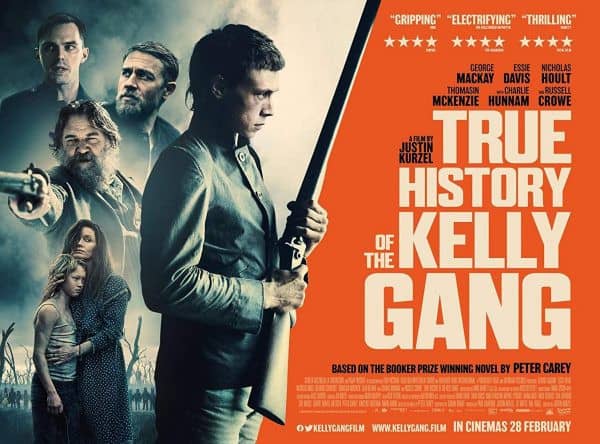True History of the Kelly Gang, 2019.
Directed by Justin Kurzel.
Starring George MacKay, Essie Davis, Orlando Schwerdt, Thomasin McKenzie, Nicholas Hoult, Charlie Hunnam, Russell Crowe and Sean Keenan.
SYNOPSIS:
A retelling of the life story of infamous Aussie outlaw Ned Kelly, from a troubled childhood to his eventual demise at the hands of the authorities.

Much like the damaged criminal at its centre, True History of the Kelly Gang wears its heart firmly on its blood-soaked sleeve. From its opening declaration that “nothing you’re about to see is true”, Australian filmmaker Justin Kurzel’s film never hides from the elusiveness of truth concerning one of his native country’s most notorious anti-heroes. On the contrary, Kurzel’s take on the infamous outlaw Ned Kelly unabashedly embraces the subjectivity of its subject’s story, imbuing his iteration with a fierce energy strewn with rugged punk undertones that penetrate the film like stray bullets piercing rusted iron.
Adapted from Peter Carey’s Booker Prize-winning novel, screenwriter Shaun Grant’s tale traces Ned’s journey from the impoverished struggles of his formative years to his famous, armour-clad final showdown with police at Glenrowan. Kelly (MacKay) acts as something of a pseudo-narrator to his own story, interjecting regularly with retrospective musings while his younger self (an impressive Orlando Schwerdt) navigates charred, unforgiving wastelands — both literal and metaphorical — as the film charts his turbulent relationship with troubled Irish mother Ellan (a terrific turn from Essie Davis) and unfiltered education in the life of a violent bushranger (courtesy of a potent Russell Crowe).

It’s a brutal, unapologetic retelling of the Kelly myth, and one where the focus boldly rejects the lure of the more conventional, camaraderie-forging criminal endeavours of Ned and his gang in favour of bigger, more challenging ideas around class, masculinity and maternity. Like the film’s playful grasp of the truth (or lack thereof), Kurzel is equally flippant in his framing of its central figure, straddling the space between reckless, adolescent outlaw and defiant rebel fighting corruption and colonialism.
MacKay captures such confliction with commendable physical and emotional conviction, most notably in a scene where Kelly talks with a local English teacher about his writings, and a visible aggression, harvested from years of turmoil, is suddenly betrayed by the vulnerability captured in tired, sorrowful eyes. Such coarse characterisation is further amplified in musician and younger brother Jed Kurzel’s striking score: a jolting blend of frantic electric guitar riffs and softer, soaring strings.

Amidst the jarring marriage of various opposing elements, True History of the Kelly Gang hits like a punk rock fever dream, weaving moments of gritty realism seamlessly with scenes of hallucinatory, strobe-lit surrealism. If there’s an area that feels disappointingly underserved however, it lies in the film’s loose handling of its own identity politics. Harbouring the potential to offer up intriguing, pertinent, progressive readings of Kelly’s ambivalent homoeroticism and the sexual ambiguity of his ragtag party of cross-dressing bandits, the film instead keeps such rumination secondary — as it does some of the story’s periphery characters — to its unyielding, sensory assault on the history books.
But, while flawed and occasionally uneven, Kurzel’s film defies convention at every turn: a spectacle both explicit and entrancing that lurches uncompromisingly into what is almost certainly a fabricated account. They often say that the truth is stranger than fiction, but in the case of Kurzel’s Ned Kelly story, it’s unlikely that the truth could ever be quite as stylish or as captivating.
Flickering Myth Rating – Film: ★ ★ ★ ★ / Movie: ★ ★ ★ ★
George Nash is a freelance film journalist. Follow him on Twitter via @_Whatsthemotive for movie musings, puns and cereal chatter.
True History of the Kelly Gang is in UK cinemas from 28th February.











